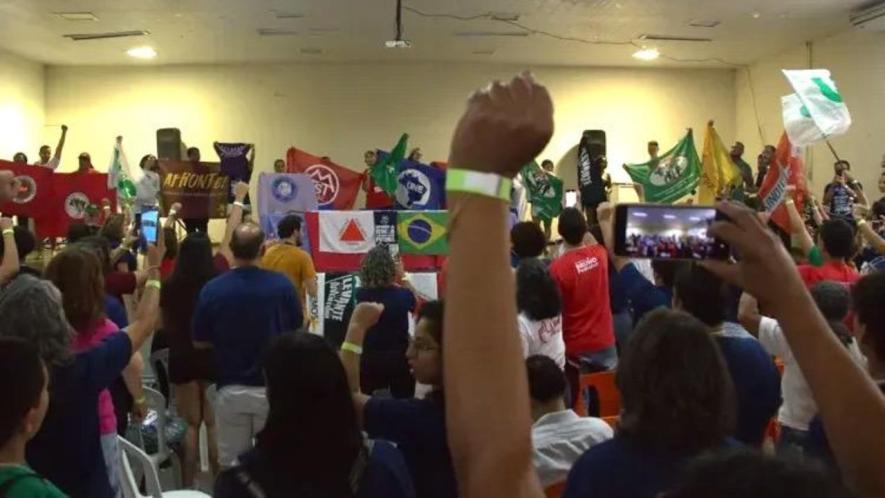Brazil Holds Referendum on Taxing Super-rich, Cutting Work Hours

Voting is in person and can take place in physical or digital ballot boxes, organized by volunteers in neighborhoods and cities across the country. Photo: Caio Jardim
A popular referendum began in Brazil on July 1, with the aim of mobilizing the Brazilian population to vote on two issues central to the lives of workers:
- Ending the 6×1 scale (six days of work and one day of rest)
- Taxing the super-rich
The initiative is being organized by popular movements, unions, progressive parties, and civil society entities, and seeks to strengthen public debate on proposals that, according to the organizers, have been blocked by the conservative Congress.
The “Popular Plebiscite Handbook” provides a detailed explanation of the main themes of the process, the topics that will be voted on, and guidelines for carrying out the vote. The document also contains practical suggestions for popular movements throughout the country to organize in their areas of struggle, raise political awareness and, especially, to get involved in carrying out the vote, which is voluntary. The voting period runs until September 7 and the results are scheduled to be announced on October 6. However, joint efforts are being organized so that the votes can be held weekly and the mobilization gains increasing support from the population.
“Our main interest is to debate with society on two structural issues related to labor and taxation,” explains Igor Felipe, representative of the National Executive Committee of the referendum. Voting is in person and can take place in physical or digital ballot boxes, organized by volunteers in neighborhoods and cities throughout the country. On the central website of the popular referendum, there are a number of options, such as a link to join the WhatsApp group, access to the website with the main information, and also a way to register a ballot box. This can be done by an individual or entity and each registration may represent one or more ballot boxes, depending on the territory or social base.
According to Felipe, the goal goes beyond counting votes: it involves mobilizing and unifying the working class around concrete demands. “We are in a position to resume a process of organization, mobilization and struggle to pressure, above all, the National Congress,” he says, arguing that Congress is afraid of the people and would like to completely eliminate the method of popular referendums. This method forces lawmakers to reveal their interests openly. “They don’t want to press the button saying that they are against people working less and that those who earn more pay more taxes,” he says.
Felipe believes that popular pressure is essential for the Lula government to be able to fulfill its campaign promises, which have faced resistance from congress and big capital. “We are proposing to interfere with the interests of minorities. They are the super-rich, millionaires, billionaires, the top echelons of the Judiciary, military pensions. Meanwhile, the right and the extreme right want to take money from hospitals, schools, universities, and pensions,” he said.
The popular referendum has been used by social movements in the country since the late 1990s and has already debated issues such as foreign debt, the Free Trade Area of the Americas (FTAA), the renationalization of Vale (a major multinational mining company), and the establishment of a Constituent Assembly to develop a new constitution. “We have a tradition, for 25 years, of popular plebiscites using this methodology. And this year we managed to build unity among all popular forces to resume this experience,” explained the activist.
Reducing work hours: end of the 6×1 scale
The proposal to reduce working hours without reducing wages and to end the 6×1 work shift gained visibility last year with the Vida Além do Trabalho (VAT) movement, led by current city councilman Rick Azevedo. “Technological development was not used to improve people’s lives, but to increase the level of exploitation of people. … Today, people get home and are responding to their bosses on WhatsApp, worried about the dynamics of work, and they wake up to their cell phones ringing,” says Igor Felipe.
The schedule in which people work six days a week with only one day off is seen as a symbol of precariousness. “People work six days a week, have one day off, and they don’t even know which one, and they don’t get overtime. It’s an extremely inhumane workday,” he points out. The end of this model is seen by workers as a way to ensure well-being and a better distribution of time between work and leisure.
Fairer tax: tax the richest
The second item on the referendum is taxation, related to the government’s proposal that those who earn more than R$50,000 per month pay more income tax, allowing exemption for those who earn up to R$5,000 per month. “Those who pay a lot of taxes in this country are workers and the middle class. Those who don’t pay are the super-rich, the billionaires, who have a series of privileges in our tax system,” Felipe denounces.
He claims that the proposal to tax the richest seeks to correct historical distortions in the Brazilian tax system, which is heavily based on consumption, penalizing those with lower incomes, unlike other more developed countries. “We want people to pay a fair tax. Those who earn less, pay nothing or less. Those who earn more, pay more. And above all, we want to end privileges,” he asserted.
The organizer hopes that the popular referendum will be able to pressure Congress – which, in his assessment, has had “even more power than the Executive branch itself” with parliamentary amendments – to vote in favor of the workers. For Igor Felipe, the action could mean a “resumption of the struggles and the advancement of the working class.”
This article was first published in Brasil de Fato in Portuguese.
Courtesy: Peoples Dispatch
Get the latest reports & analysis with people's perspective on Protests, movements & deep analytical videos, discussions of the current affairs in your Telegram app. Subscribe to NewsClick's Telegram channel & get Real-Time updates on stories, as they get published on our website.
























